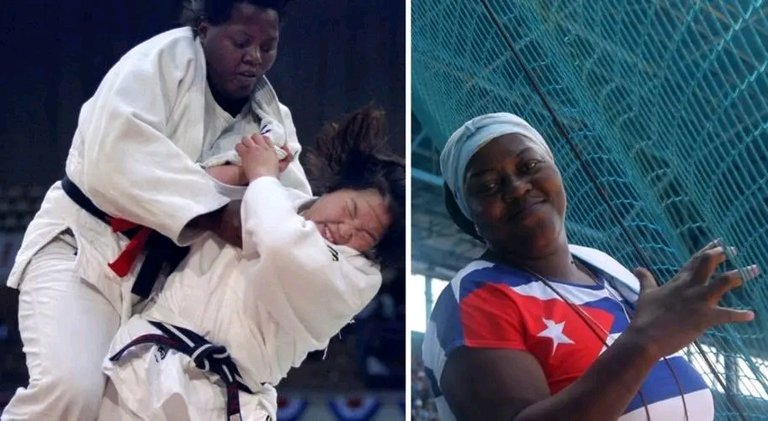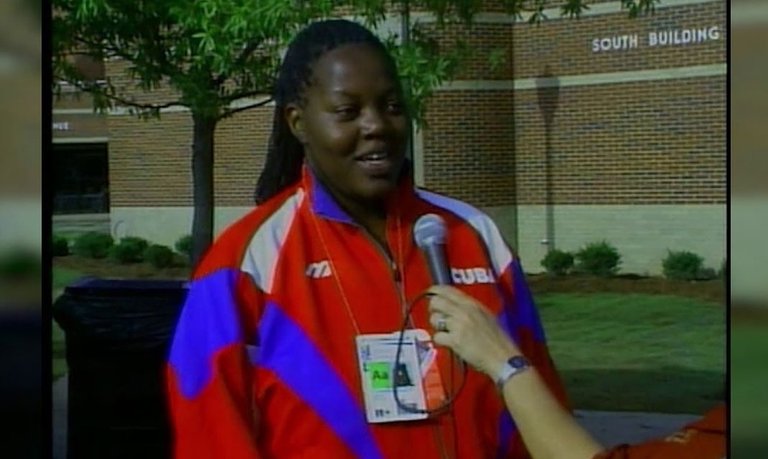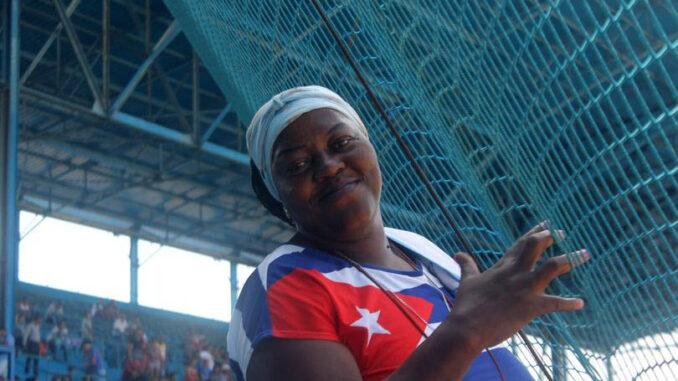Una introducción necesaria
En febrero de 2014 tuve el honor de conocer a esta destacada atleta. Más allá de su enorme palmarés deportivo, su corpulencia y su manera de ser sobre el tatami, lo que me llamó poderosamente su atención fue su nobleza y jovialidad.
Le pedí que leyera el capítulo de mi libro "Cien Momentos Relevantes del Deporte Cubano", del que ella forma parte. Me miró extrañada y leyó el escrito, cuando terminó me dijo que sabía bastante de ella y que estaba complacida con lo que este autor había plasmado en el texto.
Lamentablemente, esta gran atleta ha fallecido, cuando tenía mucho que regalarle a la vida todavía.
Por tal razón, aquí les dejo esta historia de vida que, además, es un homenaje, a una de las atletas más grande que ha dado el movimiento deportivo cubano.
Inicios
Esta agradable mujer, que impresiona a primera vista, pero que es jovial y bonachona, nació en Palma Soriano, Santiago de Cuba, un 12 de noviembre de 1967.
A pesar de alcanzar los mejores resultados en esta disciplina deportiva y ser conocida a nivel mundial por sus yukos, ippones y otras técnicas de la marcial actividad, no fue este su deporte inicial, al cual llegó como muchos otros, por casualidad o alternativa.
Su amor por el deporte comenzó por el baloncesto y mucho tiene que agradecer a Roberto Lewis, entrenador de la Escuela Superior de Perfeccionamiento Atlético (ESPA) provincial, quien avizorando en ella un gran futuro en el judo, le recomendó cambiar de disciplina deportiva.
A pesar de los reclamos del entrenador y de las condiciones físicas para el deporte (80kgs de peso y más de 1.90 de estatura), Estela siguió empeñada en continuar con sus intentos de llegar lejos, en el deporte de las canastas. En este empeño se traslada a la capital del país, pero tuvo que regresar porque no había matrícula. De vuelta en su ciudad natal se encuentra con que se había disuelto el equipo de baloncesto.
Cambió de aros y canastas por el colchón. No había alternativa: tendría que ir a ver a Lewis.
A pesar de acudir a las clases del entrenador fue difícil que accediera a entrar a un tatami. De esos primeros momentos recuerda la primera vez que asistió a un colchón de judo (con rolos en el cabello) y que la proyectaron al poner los pies en el tatami.
Primeros resultados
En 1985, alcanza la medalla de bronce en el campeonato nacional juvenil. Este resultado fue importante para ella por abrirle los pasos a la preselección nacional.
El año 1987 marcó el inicio de resultados importantes a nivel internacional al conquistar dos medallas en los Juegos Panamericanos de Indianápolis-1987, plata en la división libre y bronce en más de 72 kilogramos. En el mundial de ese mismo año terminó séptima, un resultado destacado si tenemos en cuenta que combatió embarazada.
La cumbre mundial
1989 marcaría el momento cumbre en la carrera deportiva de Estela Rodríguez Villanueva.
Ese año se celebró el Campeonato Mundial, en Belgrado, Yugoslavia y compitió en más de 72 kg y en la división libre.
En la primera división alcanzó un destacado quinto lugar y, en la segunda se alzó con la medalla de oro. Con este resultado se convertía en la primera Campeona Mundial del Judo femenino cubano.
Esta medalla le traería muchos alegrones: por una parte, fue el triunfo más disfrutado por su mamá y por otra, le permitió conocer de cerca al presidente del país, en la premiación de los atletas más destacados de ese año.
A partir de ese resultado siempre sería considerada entre las grandes favoritas, en cuanto torneo participara.
Otro resultado relevante alcanzaría con posterioridad al mundial de Yugoslavia que la colocarían entre las mejores yudocas cubanas de todos los tiempos.
Entre otros podemos señalar los siguientes: primera medallista olímpica de Cuba (alcanzó medalla de plata, en Barcelona, España 1992), en los Juegos Olímpicos del centenario, desarrollados en 1996, en Atlanta, Estados Unidos se alzó con su segunda medalla de plata olímpica; en el mundial de Barcelona 1991, alcanzó la medalla plateada; medalla de bronce en el mundial de Shiba, Japón 1995, medallas de oro en los Juegos Panamericanos de La Habana-1991, tanto en la categoría máxima como en la libre.
Estos y otros resultados le valieron para que la Unión Panamericana de Judo la incluyera en su Salón de la Fama.
Hasta siempre campeona y, gracias por las alegrías que nos regalaste.
Nota: Utilicé el traductor DeepL Translate.
ENGLISH
A necessary introduction
In February 2014 I had the honor of meeting this outstanding athlete. Beyond her enormous sporting achievements, her corpulence and her way of being on the tatami, what caught my attention was her nobility and joviality.
I asked her to read the chapter of my book "Cien Momentos Relevantes del Deporte Cubano" (One Hundred Relevant Moments in Cuban Sport), of which she is a part. When she finished, she told me that she knew a lot about her and that she was pleased with what this author had written in the text.
Sadly, this great athlete has passed away, when she still had much to give to life.
For this reason, here I leave you this life story, which is also a tribute to one of the greatest athletes of the Cuban sports movement.
Beginnings
This pleasant woman, who impresses at first sight, but who is jovial and good-natured, was born in Palma Soriano, Santiago de Cuba, on November 12, 1967.
In spite of achieving the best results in this sport discipline and being known worldwide for her yukos, ippones and other techniques of the martial activity, this was not her initial sport, to which she arrived like many others, by chance or alternative.
Her love for the sport began with basketball and she has much to thank Roberto Lewis, coach of the provincial Escuela Superior de Perfeccionamiento Atlético (ESPA), who, seeing in her a great future in judo, recommended her to change her sport discipline.
In spite of the coach's demands and the physical conditions for the sport (80kgs of weight and more than 1.90 meters tall), Estela remained determined to continue with her attempts to go far in the sport of baskets. In this endeavor she moved to the capital of the country, but had to return because there was no enrollment. Back in her hometown, she found that the basketball team had disbanded.
He traded hoops and baskets for the mattress. There was no alternative: he would have to go see Lewis.
Despite attending the coach's classes it was difficult for her to agree to enter a tatami. From those first moments she remembers the first time she attended a judo mat (with rolls in her hair) and that she was projected when she put her feet on the tatami.
First results
In 1985, she won the bronze medal in the national youth championship. This result was important for her because it opened her steps to the national pre-selection.
The year 1987 marked the beginning of important results at the international level when she won two medals in the Pan American Games of Indianapolis-1987, silver in the free division and bronze in over 72 kilograms. In the world championship of the same year, she finished seventh, an outstanding result considering that she was pregnant.
The world summit
1989 would mark the peak of Estela Rodríguez Villanueva's sporting career.
That year the World Championship was held in Belgrade, Yugoslavia, and she competed in the over 72 kg and in the free division.
In the first division she reached an outstanding fifth place and in the second she won the gold medal. With this result she became the first World Champion of Cuban women's Judo.
This medal would bring her many joys: on the one hand, it was the most enjoyed triumph for her mother and on the other hand, it allowed her to meet the president of the country at the awarding of the most outstanding athletes of that year.
From that result on, she would always be considered among the great favorites in any tournament she participated in.
Other relevant results she would achieve after the World Championship in Yugoslavia that would place her among the best Cuban judokas of all times.
Among others we can point out the following: Cuba's first Olympic medalist (she won a silver medal in Barcelona, Spain 1992), in the Centennial Olympic Games, held in 1996, in Atlanta, United States, she won her second Olympic silver medal; in the World Championship in Barcelona 1991, she won the silver medal; bronze medal in the World Championship in Shiba, Japan 1995, gold medals in the Pan American Games in Havana-1991, both in the maximum and free categories.
These and other results were enough for the Panamerican Judo Union to include her in its Hall of Fame.
Farewell champion and thank you for the joys you gave us.
Note: I used the translator DeepL Translate.



Es una pena que Cuba haya perdido esta gran atleta cuando aún le faltaba mucho por dar. Bonito homenaje amigo. Feliz noche para ti y muchas gracias por compartir. Saludos.
Así es amiga @mariolisrnaranjo. A pesar de estar retirada como atleta, sus conocimientos y experiencias eran muy valiosas para las nuevas generaciones de judocas. Gracias por pasar y comentar. Feliz noche para ti también. Salud y saludos.
Es algo generalizado que las personas de gran tamaño y poderío físico y muy importante, conscientes de ello, se muestren bonachonas y de buen carácter. Por supuesto hay excepciones.
Siento pena por enterarme que haya fallecido, aunque me alegra este reconocimiento tuyo.
Saludos amigo @tonyes
Esta deportista fue un ejemplo de calidad tanto humana como deportiva y su modestia y sencillez la hizo más grande de lo que fue.
Afortunadamente tuve la posibilidad de conocerla y dialogar con ella
Gracias por pasar y compartir sus criterios. Feliz jornada. Salud y saludos.